 Unified Airline Alliances Urged as Key to Nigeria’s Aviation Recovery and Growth
Unified Airline Alliances Urged as Key to Nigeria’s Aviation Recovery and Growth
The Nigeria Civil Aviation Authority (NCAA) has issued a clarion call for Nigerian carriers to embrace deeper collaboration and unity if the country’s aviation sector is to rise above persistent financial and operational turbulence. This strategic recommendation comes amid mounting pressure on domestic airlines to deliver sustainable results despite challenging market conditions and rising operating costs.
Addressing stakeholders at the recent Civil Aviation Cost Recovery Optimization Stakeholders’ Retreat in Lagos, Mr. Godwin Ameh, NCAA’s General Manager for Finance and Accounts, underscored the urgent need for operators to move past expressions of frustration and instead pioneer practical, homegrown solutions. He emphasized that while government support and targeted incentives remain vital, the industry’s future lies in its own readiness to innovate and collaborate.
Drawing from extensive experience auditing Nigerian carriers, Ameh lamented the sector’s longstanding reluctance to adopt the cooperative approaches widely practiced in mature aviation markets. He pointed to the relative absence of code-share agreements and alliance partnerships in Nigeria—mechanisms that have been essential to optimizing operations, reducing costs, and enhancing load factors for airlines elsewhere.
His observations were brought to life by a real-world example: “I boarded a Boeing 737 from Abuja to Lagos with seating for more than 120 passengers, but fewer than 15 seats were occupied,” Ameh recounted to the gathered audience. “How can an airline hope to survive with such numbers? If your average load factor is just 45 percent, you’re effectively flying more than half your seats empty, yet incurring the same full costs for fuel and operations. With code-share arrangements, these inefficiencies can be significantly reduced.”
The NCAA official further criticized the presence of unhealthy rivalries and political divisions among domestic carriers, arguing that these dynamics have undermined the industry’s ability to present a united front and secure meaningful reforms. He specifically cited the Airline Operators of Nigeria (AON), remarking that the association has become “more cosmetic than functional,” as individual airlines often pursue their interests in isolation rather than leveraging collective strength.
“Airlines like Ibom Air, Air Peace, and others must stop making separate appeals to government,” he asserted. “The industry’s voice will carry more weight and credibility if it speaks as one.” Ameh’s comments reflect a broader sentiment within the sector that unity is essential to amplifying the interests of local carriers and increasing their influence in policy discussions.
He also highlighted the importance of constructive engagement with both government and regulatory authorities. By adopting a cooperative posture, airlines can improve their bargaining position and foster a policy environment that is more responsive to their operational realities. “If airlines can come together,” Ameh said, “their voices will reach decision-makers faster than individual complaints.”
The retreat’s discussions made it clear that resolving the aviation sector’s cost recovery issues will require more than just regulatory tweaks or short-term bailouts. Ameh called for a sustained commitment to consistent dialogue, mutual trust, and shared responsibility between government, regulators, and operators. Only through such partnership, he argued, can the industry establish a foundation for long-term growth, resilience, and global competitiveness.
For Africa’s broader aviation community, Nigeria’s experience offers valuable lessons. The absence of alliances and coordinated commercial strategies among domestic carriers has led to chronic underutilization of capacity and recurring financial distress. By contrast, markets in Europe, North America, and Asia have long demonstrated the benefits of airlines pooling resources, sharing routes, and jointly marketing services to achieve scale and stability.
In the Nigerian context, the potential advantages of such arrangements are especially compelling. Shared flights and code-sharing can allow airlines to consolidate passenger traffic, fill more seats, and spread operational costs across larger networks. These efficiencies not only bolster profitability but also enhance service reliability, frequency, and customer choice—attributes that are critical to regaining public confidence and stimulating demand.
However, forging successful alliances will require a change in mindset among Nigerian operators. Industry stakeholders must overcome historic rivalries and political divisions that have often stymied progress. This will entail building a culture of trust, transparency, and mutual benefit, where airlines recognize that their collective success depends on cooperation as much as competition.
Importantly, the call for unity is not intended to diminish the role of government. On the contrary, Ameh and other experts emphasize that effective regulatory support, targeted incentives, and a stable policy environment are crucial to enabling alliances to flourish. Yet, these measures will only be effective if airlines themselves are ready to take the lead in finding common ground and advancing shared objectives.
The time is ripe for Nigerian carriers to seize this opportunity. With increasing competition from foreign airlines and shifting passenger expectations, the ability to operate at scale and deliver efficient, reliable service is more important than ever. By forging stronger partnerships—whether through formal alliances, route-sharing, or joint marketing initiatives—Nigeria’s aviation sector can position itself for renewed growth and stability in the years ahead.
As the industry looks to the future, it will be those carriers that embrace collaboration and unity who are best placed to navigate the complexities of the modern aviation landscape. For Nigerian operators, the message from the NCAA is clear: the path to sustainability and success lies not in isolation, but in forging genuine alliances that unlock the full potential of the industry for all stakeholders.
